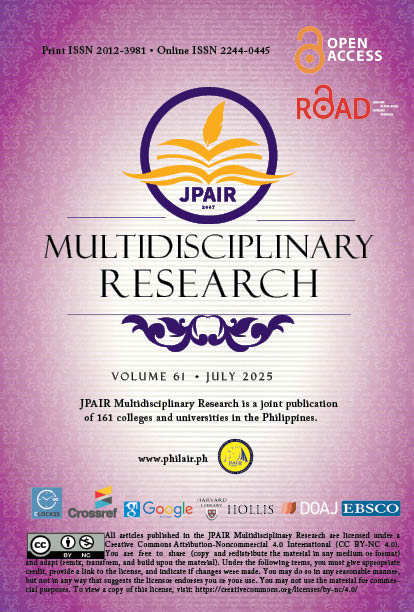Family Culture, Value Systems, and Governance in Cebu-Based Family Enterprises: Developing a Framework for a Family Constitution
DOI:
https://doi.org/10.7719/jpair.v61i1.945Keywords:
Family Culture, Value System, Family Governance, Family Constitution, Cebu-Based Enterprise, PhilippinesDisciplines:
Business, ManagementAbstract
Family enterprises are a prominent business structure worldwide, significantly contributing to a country's economic growth. This business is deeply rooted in family values, norms, traditions, and culture, which influence how the business evolves. This descriptive-correlational study investigated how family culture and value system factors were manifested, acknowledged, and implemented among Cebu-based family enterprises that participated in the study. The study also analyzed further how these factors predict family governance performed by the respondents. A total of sixty (60) family business owners participated in answering the survey questionnaire, aiming to address all the study’s inquiries. A weighted mean, standard deviation, and multiple regression analysis were employed in the study. The study found that family culture and value systems were generally manifested, acknowledged, and implemented, as perceived by the respondents. Further study analysis indicated that family culture and value systems are significant predictors of family governance. This finding suggests that initiatives to enhance family culture and value systems could effectively mitigate challenges associated with strengthening governance within family businesses. Consequently, the study concludes that the reinforcement of effective governance in family enterprises is most successfully achieved through a focus on cultural alignment, strategic clarity, and inclusive leadership. In the end, the study developed a family constitution framework that serves as the foundation for fostering a harmonized relationship in a family business.
Downloads
References
Achmad, W. (2022). Corporate Social Responsibility and Zakat: A Model of Philanthropy in the Social Era 5. 0. Jurnal Scientia, 11(01), 565–574. https://seaninstitute.org/infor/index.php/pendidikan/article/view/579
Agrawal, R., & Bhavani, G. (2021). Family Business Governance. Transforming Corporate Governance and Developing Models for Board Effectiveness. https://doi.org/10.4018/978-1-7998-6669-5.ch002.
Alam, A. (2024). The impact of operations management practices in improving organisational performance. International Journal of Information Technology and Management. https://doi.org/10.29070/xyhbv932.
Alipour, K., Barber, D., Batchelor, J., Peake, W., Jones, S., & McIlveene, T. (2024). Family business culture: a strategic resource and driver of firm performance. Journal of Family Business Management. https://doi.org/10.1108/jfbm-03-2024-0064.
Downloads
Published
Issue
Section
License
Copyright (c) 2025 Philip Jun A. Pagatpat, Mark Anthony N. Polinar

This work is licensed under a Creative Commons Attribution-NonCommercial 4.0 International License.
Open Access. This article published by JPAIR Multidisciplinary Research is licensed under a Creative Commons Attribution-Noncommercial 4.0 International (CC BY-NC 4.0). You are free to share (copy and redistribute the material in any medium or format) and adapt (remix, transform, and build upon the material). Under the following terms, you must give appropriate credit, provide a link to the license, and indicate if changes were made. You may do so in any reasonable manner, but not in any way that suggests the licensor endorses you or your use. You may not use the material for commercial purposes.





















